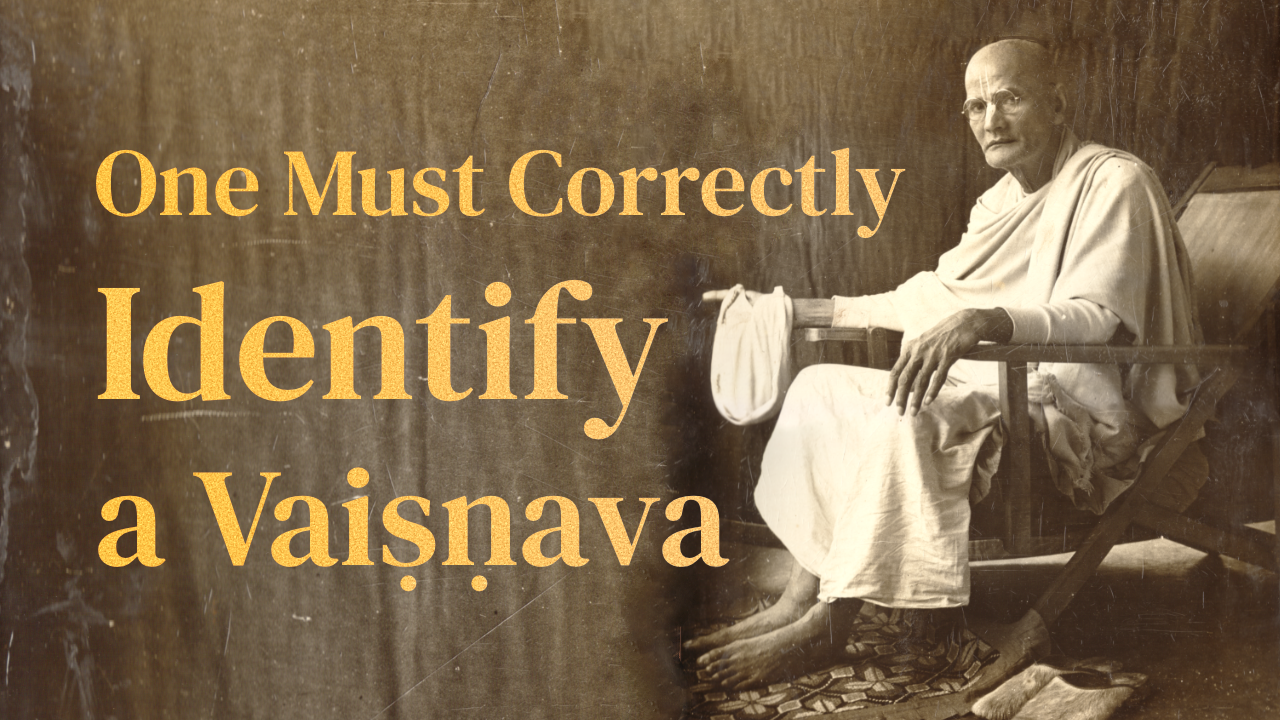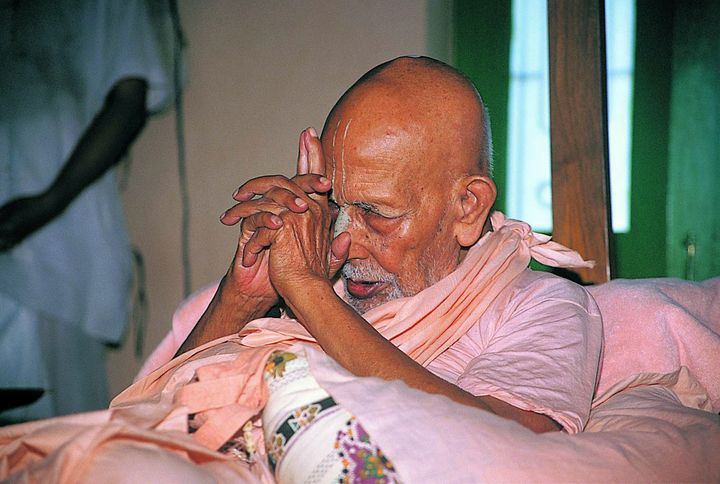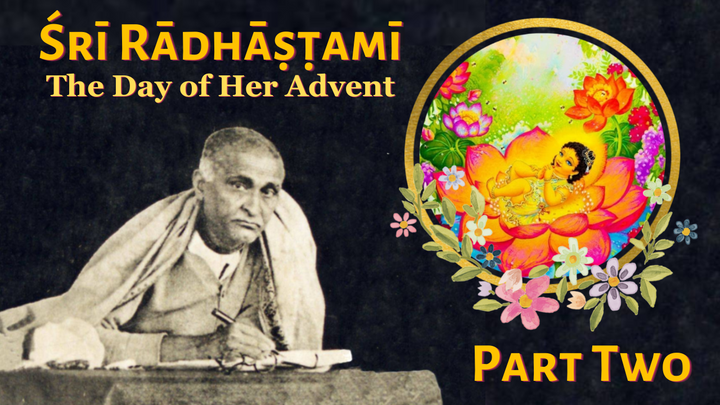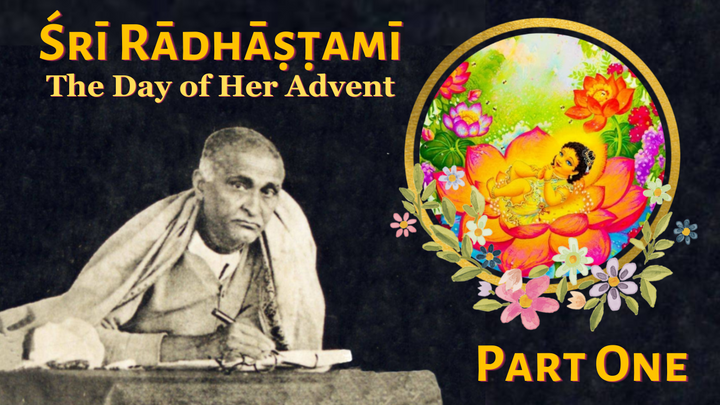One Must Correctly Identify A Vaiṣṇava

by Śrī Śrīmad Bhakti Prajñāna Keśava Gosvāmī Mahārāja
(Listen to the article read out below)
Some Misconceptions
The mercy of śrī guru and the Vaiṣṇavas is the one and only means by which a jīva can attain the ultimate goal of life. Only by their mercy is it possible for him to obtain the merciful, sidelong glance of the most compassionate Śrī Bhagavān. This we have heard repeatedly.
We have also heard that the mercy of śrī guru and the Vaiṣṇavas is causeless. It is never brought about by anything of this world, nor by the impersonal, undifferentiated state of any such thing. We fail to grasp the nature of that mercy as independent of any material cause, and therefore we often ascribe imagined characteristics to it. We may think that there is no need for us to serve with resolute determination and careful, ardent endeavour; we can simply continue following our own fancies and, by the grace of śrī guru and the Vaiṣṇavas, all our cherished desires will one day suddenly come true. We may even think that to earnestly apply oneself in devotional service is but another expression of the mood to enjoy and a whimsical pursuit. Alternatively, we may imagine that bound jīvas like us can realise our cherished desires independently, without the mercy of sādhus and śrī guru.
Those who hold such opinions are unable to understand that the mercy of sādhus and the jīva’s intent desire to serve are one and the same. Their deceitful words reveal that they are not truly yearning, with a heart full of remorse, to receive the mercy of sādhus.
Why Identify the Level of a Vaiṣṇava?
The mahājanas, great realised souls, have explained the method to obtain the mercy of the Vaiṣṇavas:
ĵe ĵeno vaiṣṇava, ciniyā loiyā,
ādara koribo ĵabe
vaiṣṇavera kṛpā, ĵāhe sarva-siddhi,
avaśya pāibo tabe
One who has become qualified to discern the level of eligibility (adhikāra) of those who have taken to the path of devotion and to thereby differentiate between the kaniṣṭha-bhakta (novice devotee), madhyama-bhakta (intermediate devotee) and uttama-bhakta (advanced devotee), is duty-bound to honour those three types of Vaiṣṇavas appropriately. This is the meaning of the words ĵe ĵeno vaiṣṇava.
It is improper to honour a kaniṣṭha-adhikārī in a way that befits only an uttama-adhikārī, or to deal with a madhyama-adhikārī as if he were a kaniṣṭha-adhikārī. Only when we respect Vaiṣṇavas in a manner befitting their respective qualification can we become free from knowingly or unknowingly committing vaiṣṇava-aparādha. Only then can we realise the transcendental, merciful form of the Vaiṣṇavas, which bestows all desired perfection.
Therefore, the ability to correctly identify a Vaiṣṇava is indispensable. Simply by doing so, we are automatically filled with honour and affection for him. Upon recognising your brother, you are at once overcome by brotherly affection that is incomparably sweet. Our exclusive aim is to be able to recognise a Vaiṣṇava and consider him our property, our own dear well-wisher, and to develop an affectionate bond with him.
It is insufficient merely to dwell on how much the Vaiṣṇavas love us or consider us to be their own. This is because the personal satisfaction that comes from thinking we are loved by the Vaiṣṇavas is nothing but an external symptom of the desire for sense gratification, which lurks in the deepest region of our hearts. If, instead, we begin to measure how much we have become bound in affection to the Vaiṣṇavas, it indicates that we are on our way to attaining the very perfection of all desires. Until we can identify Vaiṣṇavas and develop an intimacy with them in which we regard them as our bosom friends, we will be unable to realise the true nature of their affection for us.
Divine and Mundane Qualities
But before we can begin identifying Vaiṣṇavas or developing close affection for them, there are many issues we need to examine first. While trying to classify a Vaiṣṇava, we will discern, from the mundane perspective, many fine qualities in him, just as we will also chance to see his faults. Commonly, we are attracted by a Vaiṣṇava’s modesty, affection, natural forbearance and generosity. We tend to assess someone’s eligibility as a Vaiṣṇava solely by noting these virtues, which attract us and arouse in us a semblance of affection for him.
It is important, and appropriate, for us to analyse and reflect upon the nature of these “external” virtues. By doing so we can determine whether or not we actually have darśana of a Vaiṣṇava by observing such qualities in him and, as a result, becoming attached to him and showing him honour. A Vaiṣṇava should be identified and honoured on the basis of his vaiṣṇavatā, or quality that best defines a Vaiṣṇava. This quality is the Vaiṣṇava’s exclusive dedication to the service of Śrī Viṣṇu, and it is this that comprises his real nature. If we want to identify a Vaiṣṇava, we need simply measure how dedicated he is to serving Śrī Viṣṇu.
Śrīla Kavirāja Gosvāmī Prabhu has listed the twenty-six qualities of a Vaiṣṇava, among which the intrinsic characteristic (svarūpa-lakṣaṇa) or defining quality is exclusive surrender to Śrī Kṛṣṇa (kṛṣṇaika-śaraṇa). The remaining twenty-five qualities manifest under the shelter of this primary characteristic and further enhance its sweetness. These qualities will surely be present in Vaiṣṇavas, along with their vaiṣṇavatā, or hallmark, exclusive surrender to Śrī Kṛṣṇa. One cannot find a Vaiṣṇava who is not gentle and well-behaved; however, these virtues develop according to the strength of his vaiṣṇavatā.
The point here is that in enumerating these different qualities, Śrīla Kavirāja Gosvāmī is not referring to our usual conception of them. From our mundane perspective, we may also detect the qualities of a Vaiṣṇava that are listed by Śrīla Kavirāja Gosvāmī in persons who are not Vaiṣṇavas, such as the followers of varṇāśrama-dharma. In truth, however, it is impossible for a non-Vaiṣṇava to possess the qualities of a Vaiṣṇava. Whatever is synonymous with the word vaikuṇṭha, which denotes the abode of the Supreme Lord, is not limited, temporary and gross like the objects of this world. But everything else indicated by the words of this world is entirely worthless. Therefore, only extremely superficial observers will think that the qualities of a Vaiṣṇava can also be found in non-Vaiṣṇavas. For instance, Śrīla Kavirāja Gosvāmī has listed magnanimity (vadanyatā) as a Vaiṣṇava quality. An ordinary person can be “magnanimous” according to the conventional meaning (ajña-rūḍhī-vṛtti) of the word. But this adjective cannot be applied to anyone except a Vaiṣṇava when it is given its truest and most profound sense (vidvat-rūḍhī-vṛtti).
Our Misguided Vision
But who will look out for the superlative quality of a Vaiṣṇava? Only he who has realised its supremacy. In other words, only that person who has himself developed a service attitude will appreciate the importance of honouring this defining characteristic of a Vaiṣṇava. Only to he who has surrendered without duplicity are all the virtues of a Vaiṣṇava revealed in their true aspect. Such a person alone beholds the transcendental and extraordinary qualities of a Vaiṣṇava, without likening them to mundane qualities and thus inviting offences.
But we are devoid of a service attitude; and therefore we cannot comprehend this secret of recognizing a Vaiṣṇava by his vaiṣṇavatā. All too often we are attracted by a Vaiṣṇava’s other qualities, like his ample affection. We praise his patience, tolerance and other “external” virtues, but we should bear in mind that a Vaiṣṇava’s qualities are not objects for our sense gratification. If the qualities I detect in a Vaiṣṇava, like affection and patience, do not inspire me to engage in the service of Śrī Viṣṇu and the Vaiṣṇavas, and do not lead me to become attracted to his vaiṣṇavatā, then it should be understood that I have been unable see their true aspect. In other words, I have simply been trying to satisfy my senses.
All the qualities of a Vaiṣṇava are certainly present in every Vaiṣṇava. If according to our material vision we conclude that Śrīla Kṛṣṇadāsa Kavirāja Gosvāmī Prabhu was a poet, but that Śrī Śivānanda Sena or Śrī Govinda, the servant of Śrīman Mahaprabhu, were not all that poetic, then we have not properly understood the Vaiṣṇava’s quality of being poetic (kavitvā). Rather, by considering Śrīla Kavirāja Gosvāmī to be an ordinary author, we merely see in him a rare and exceptional material talent – the gift of poetry.
Those with material intelligence are unable to judge a Vaiṣṇava by his exclusive surrender to Śrī Kṛṣṇa (kṛṣṇaika-śaraṇa). They consider him an ordinary person, and end up seeing his faults and assessing his vaiṣṇavatā by looking at what is merely a semblance of his virtues. When they see the grave disposition of a particular Vaiṣṇava, they will liken it to the gravity of a common man and praise him, considering this virtue to be the sole benchmark of his vaiṣṇavatā. But if another Vaiṣṇava conceals his gravity, they will not consider him to be a Vaiṣṇava or, even if they do, they will say that he is not as grave as that first Vaiṣṇava. Their words are as meaningless as the statement “a stone container made of gold”.
I begin my journey to hell by being envious of a Vaiṣṇava, seeing in him the semblance of faults, which are unpleasant to my senses. And I suffer equally by being affectionate to a Vaiṣṇava upon seeing in him the semblance of good qualities, which are pleasing to my senses. In both cases, my vision is limited to the mundane realm, and I am not fortunate enough to be able to recognise the transcendental Vaiṣṇava. Hence, in trying to find a Vaiṣṇava, we should not simply end up selecting someone who possesses mundane qualities or who is devoid of them.
A Concern
The mahājanas have stated: “Vaiṣṇava cinite nāre devera śakati – it is impossible even for the demigods to properly identify a Vaiṣṇava.” This may lead me to wonder how I – a helpless and feeble being who is ignorant and foolish – can ever hope to recognise a Vaiṣṇava? How will I be able to understand his vaiṣṇavatā? As long as I remain ignorant of sambandha-tattva, the principle of one’s relationship with Śrī Kṛṣṇa, and continue to lack faith in the mercy of the Vaiṣṇavas, I will be subject to various types of misgivings and be deprived of this mercy.
One Vaiṣṇava has given a very beautiful and remarkably logical answer to this question. It is indeed true, he said, that the demigods themselves are unable to recognise a Vaiṣṇava, but why should this be cause for concern. The emperor may be unable to recognize my mother, but that will hardly prevent me from being able to recognise her, even if I were but a tiny baby.
When I was an infant, I did not understand what relationship my mother had with me, nor was I able to realise her deep love and affection for me. Although I was ignorant, it does not follow that my mother was not my mother at that time or that I was deprived of her affection. I always remained related to her and did not forego her maternal affection, despite being unable to understand who she is. Nourished by her love I have now attained adulthood and am able to appreciate how she is related to me and what maternal affection is. During infancy, I did not understand my mother; therefore, I could not realise the sweetness of her affection, although she showered me with it. But I have now grown into an adult through her love and nurturing. By her affection and mercy, I am now able to realise who she is and have now developed a feeling of possessiveness (mamatā) towards her.
When the practising devotee attains madhyama-adhikāra, he is able to ascertain the eligibility of a Vaiṣṇava and show him due affection. Only then is he able to receive the mercy of the Vaiṣṇavas. It is also by the mercy of the Vaiṣṇavas that one reaches the madhyama stage. Indeed, their mercy is at play at all times. Only by the compassion of the Vaiṣṇavas does the jīva who is averse to Bhagavān and full of anarthas develop the tendency to chant the holy name of Bhagavān in the kaniṣṭha level. But the kanistha-adhikārī is unable to realise this, and this is what makes him a kaniṣṭha devotee.
The Vaiṣṇavas shower their mercy upon the kaniṣṭha-adhikārī without his knowing it, and this mercy covertly and imperceptibly elevates him to the madhyama level. Then, only by the mercy of the Vaiṣṇavas does he develop the ability to discern what level a Vaiṣṇava is on and offer him due respect. We do not need to create our relationship with the Vaiṣṇavas, for it is eternal. Our objective is simply to realise that relationship, and this is possible only by the strength of their mercy. Why, then, should we have any concern about being unable to identify Vaiṣṇavas.
Have We Really Made the Vaiṣṇavas Our Own?
The degree to which I have been able to make a Vaiṣṇava my property and honour him can be measured by one criteria only: how indifferent or apathetic I have become towards non-Vaiṣṇavas, realising that they have no relation with me. Unless one is wholly indifferent towards non-Vaiṣṇavas, that is, has no relationship with them at all, one has no hope of ever developing a sense of kinship with the Vaiṣṇavas.
Our conviction that the Vaiṣṇavas belong to us develops in proportion to our feeling that non-Vaiṣṇavas are outsiders. This is not mere talk. If I really wish to be related to the Vaiṣṇavas, I must first renounce my attachment to non-Vaiṣṇavas. If my mother, father, brothers, friends and so-called close relatives become hostile to the service of the Vaiṣṇavas and to the supreme conscious Entity, then I will have to become wholly indifferent to them, regarding them as unrelated to me in any true sense.
This includes my very own body and mind. Until I attain such determination, to think of the Vaiṣṇavas as my property is nothing but deceit. A person cannot have possessiveness towards or kinship with the Vaiṣṇavas while considering non-Vaiṣṇavas to be related to him – the two are mutually contradictory.
Translated from Śrī Gauḍīya Patrikā, Year 7, Issue 9
by the Rays of The Harmonist team
Published in CC-BY-SA Rays of the Harmonist, No. 14 (Kartika 2004)



Comments ()